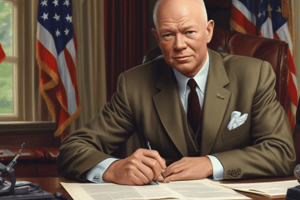Podcast
Questions and Answers
What event led to explosive racial tensions in the United States in the 1950s? yes
What event led to explosive racial tensions in the United States in the 1950s? yes
- Election of Dwight D. Eisenhower
- Brown v. Board of Education ruling (correct)
- Integration of Central High School
- Economic growth post-World War II
Why did Governor Orville Faubus order the Arkansas National Guard to prevent the black students from attending Central High School?
Why did Governor Orville Faubus order the Arkansas National Guard to prevent the black students from attending Central High School?
- To uphold the law and protect the students
- To support the civil rights movement
- To discuss a solution with President Eisenhower
- To escalate the crisis and defy the federal government (correct)
What military unit was deployed to Little Rock to uphold the law and protect the students?
What military unit was deployed to Little Rock to uphold the law and protect the students?
- 10th Mountain Division
- 1st Infantry Division
- 101st Airborne (correct)
- 82nd Airborne
What message did Dwight D. Eisenhower's actions send to other states attempting to defy the federal government?
What message did Dwight D. Eisenhower's actions send to other states attempting to defy the federal government?
Flashcards are hidden until you start studying
Study Notes
- Dwight D. Eisenhower becomes President of the United States in the mid-1950s, during a period of post-World War II confidence and economic growth.
- Eisenhower grew up in Abilene, Kansas, and had no black friends or experience with racial issues.
- Brown v. Board of Education (1954) rules that segregation in education is unconstitutional, leading to resistance from the South and creating explosive racial tensions.
- In 1957, at the town of Little Rock, Arkansas, nine black students (the Little Rock Nine) are selected to integrate Central High School, but are prevented from attending by a white mob.
- Governor Orville Faubus of Arkansas orders the Arkansas National Guard to prevent the students from attending, escalating the crisis.
- Eisenhower invites Faubus to Newport to discuss a solution, but Faubus refuses to back down, leading Eisenhower to send in the 101st Airborne to enforce the law and integrate the school.
- The 101st Airborne, a renowned military unit that liberated Europe during World War II, is deployed to Little Rock to uphold the law and protect the students.
- The students, now with the support of the federal government, are able to attend Central High School, marking a significant victory for the civil rights movement.
- Eisenhower's actions send a message to other states attempting to defy the federal government, preserving the union and upholding the law.
Studying That Suits You
Use AI to generate personalized quizzes and flashcards to suit your learning preferences.




